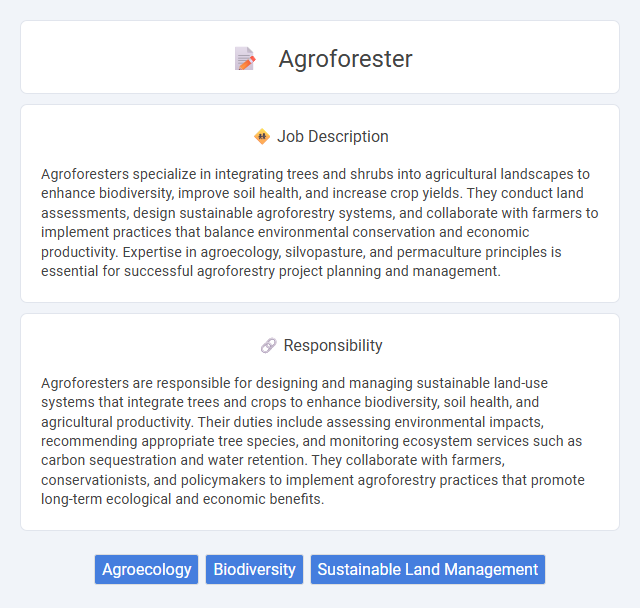
Agroforesters specialize in integrating trees and shrubs into agricultural landscapes to enhance biodiversity, improve soil health, and increase crop yields. They conduct land assessments, design sustainable agroforestry systems, and collaborate with farmers to implement practices that balance environmental conservation and economic productivity. Expertise in agroecology, silvopasture, and permaculture principles is essential for successful agroforestry project planning and management.
Individuals who enjoy working outdoors and have a strong commitment to environmental sustainability will likely find agroforestry roles suitable. Those with physical stamina and an interest in combining agriculture and forestry practices might feel well-suited for the hands-on nature of this work. People who prefer a dynamic work environment that involves fieldwork and community collaboration may have a higher probability of thriving as agroforesters.
Qualification
An Agroforester typically requires a bachelor's degree in environmental science, agriculture, forestry, or a related field, with a strong emphasis on ecosystem management and sustainable land use practices. Practical experience in soil conservation, agroecology, and forest management is essential, often gained through internships or fieldwork. Proficiency in GIS technology and knowledge of local agricultural regulations enhance an Agroforester's effectiveness in developing integrated land-use plans.
Responsibility
Agroforesters are responsible for designing and managing sustainable land-use systems that integrate trees and crops to enhance biodiversity, soil health, and agricultural productivity. Their duties include assessing environmental impacts, recommending appropriate tree species, and monitoring ecosystem services such as carbon sequestration and water retention. They collaborate with farmers, conservationists, and policymakers to implement agroforestry practices that promote long-term ecological and economic benefits.
Benefit
Working as an agroforester likely offers the benefit of contributing to sustainable land management and environmental conservation. This role probably enhances biodiversity while supporting agricultural productivity and soil health. Income stability and opportunities for field research may also be probable advantages of this career.
Challenge
The role of an Agroforester likely involves managing complex ecosystems that require balancing agricultural productivity with environmental sustainability, posing significant challenges in resource allocation and ecological impact. There is a high probability that adapting to climate change and unpredictable weather patterns further complicates long-term planning and crop-forest integration. Overcoming these challenges demands specialized knowledge in both forestry and agriculture, often requiring innovative problem-solving skills and continuous learning.
Career Advancement
An agroforester's career advancement hinges on expertise in sustainable land management, ecosystem restoration, and agroecological practices. Gaining certifications in environmental management and mastering GIS technology amplifies opportunities in research, consultancy, and policy-making roles. Networking within agricultural and environmental organizations further accelerates progression to senior project leadership and academic positions.
Key Terms
Agroecology
An Agroforester specializing in agroecology designs sustainable land-use systems that integrate trees, crops, and livestock to enhance biodiversity and soil health. They implement ecological principles to promote resilient farming practices, reduce chemical inputs, and improve carbon sequestration. Expertise in soil management, plant ecology, and ecosystem services drives the successful restoration of degraded landscapes and supports climate-smart agriculture.
Biodiversity
Agroforesters play a crucial role in enhancing biodiversity by integrating trees and shrubs into agricultural landscapes, promoting habitat diversity, and supporting wildlife populations. Their expertise in sustainable land management helps restore ecological balance, improve soil health, and increase the resilience of ecosystems against climate change. Implementing agroforestry practices leads to richer biodiversity, benefiting pollinators, birds, and beneficial insects essential for crop productivity and environmental sustainability.
Sustainable Land Management
Agroforesters specialize in Sustainable Land Management by integrating trees and shrubs into agricultural landscapes, enhancing biodiversity, improving soil fertility, and preventing erosion. Their expertise contributes to carbon sequestration and water conservation, promoting long-term ecological balance and increased crop productivity. Effective agroforestry practices support climate resilience and sustainable livelihoods for rural communities.
 kuljobs.com
kuljobs.com